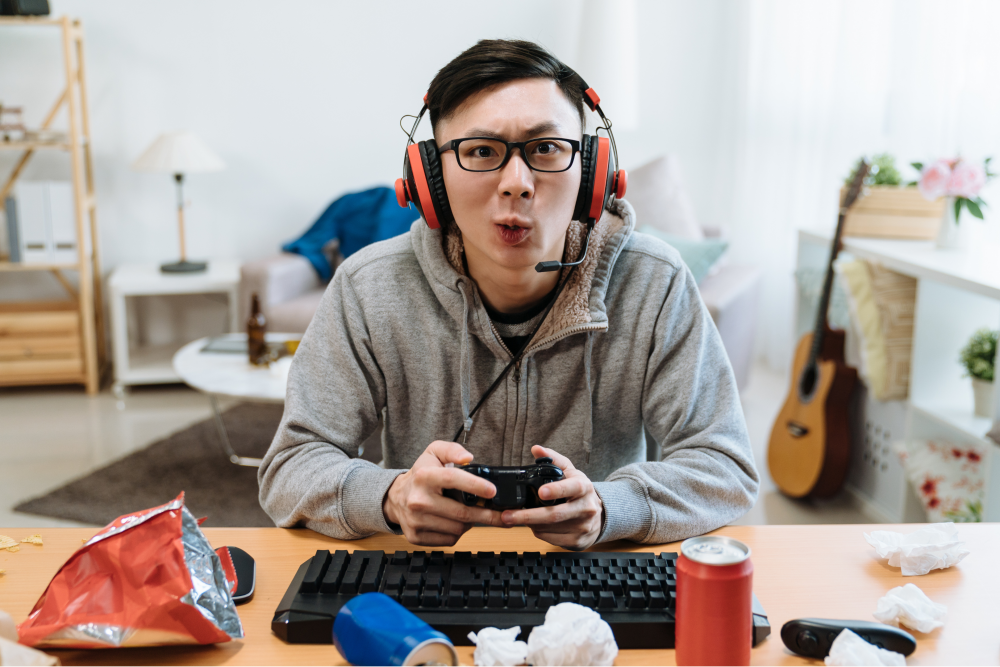
Introverts often find solace in spaces where they can have their own moment, away from the hustle and bustle of social gatherings. So, picture them stepping into a virtual world where everything feels tailor-made, and it makes perfect sense why they’re drawn to gaming.
Gaming offers a universe where introverts can escape without stepping outside their comfort zone. The immersive nature of video games provides a gateway to adventures and stories, offering rich experiences minus the small talk. It’s like being part of an epic tale…
…without leaving the couch!
What makes video games a great fit for introverts? Imagine having control over when and how to engage with others. This is what these digital platforms offer with their pace and voluntary interaction. You choose when to pause, explore or invite someone to join in on a quest.
The question many folks ask is, ‘Are video games good for introverts?’
The answer is yes. They provide a unique setting for introverts to socialize without the pressure of in-person interactions. Games allow them to dip into social interaction on their own terms, meeting others who share similar interests and vibes.
Gaming As a Social Platform: Breaking Barriers and Building Communities
Gaming has turned into a bustling social scene, kind of like the new-age campfire where stories get swapped and friendships spark. Thanks to technology, gamers aren’t just connecting with the people in their neighborhood but with folks from around the globe.
What’s interesting about gaming is how it creates these awesome shared experiences. Players come together over epic battles, mysterious quests, or just casual virtual hangouts. It’s a community vibe where everyone brings something to the table, creating bonds without the awkward social pretense some might dread.
So, how good is gaming for building social bridges? Think of it as the modern-day way to socialize where anyone can join, regardless of location or social skills. Many gamers find their crew online, making bonds that sometimes translate into real-life connections or long-lasting friendships.
There’s plenty of ways to interact while gaming—think voice chats, multiplayer modes, and even virtual meet-ups. These interactions can transform a typically solo activity into a lively, shared endeavor. For introverts, this means being part of a community without feeling overwhelmed.
Plenty of folks have shared stories of how they found their closest friends or even met their significant other through games. For them, gaming wasn’t just a pastime; it was a gateway to meaningful social connections.
The Mechanics of Socialization in Video Games: Beyond the Screen
Video games are more than just pixels and scores; they’re packed with features that scream social interaction. Imagine games that push players to strategize, cooperate, and sometimes throw a little friendly shade—this is where real bonds form, far from what any chat room could offer.

- Cooperation & Competition – understanding how these digital realms promote socializing is fascinating. Competitive and cooperative gameplay require real teamwork. Whether defending a fortress or completing a mission, players are often talking, planning, and laughing together.
- Avatars In Action – avatars play a key role too. They aren’t just digital puppets; they’re extensions of one’s personality. Through these characters, individuals express themselves, often finding like-minded players who appreciate who they are both in and out of the game.
Some games go all out, specifically designed with social interaction in mind. Whether it’s online board games or massively multiplayer online games (MMOs), these titles bring people together with activities that break the ice and sometimes create real-world friendships.
The Broader Social Benefits of Gaming: Why Games Matter
Gaming’s significance stretches far beyond entertainment, like secret lifelines for boosting social skills and mental well-being. Games act like gateways, opening doors to friendships and offering a break from the everyday stressors of life.
Why are games so crucial to the art of socializing?
- Psychological Benefits – from a psychologist’s perspective, these digital playgrounds nurture empathy and collaboration. When players work together to solve puzzles or overthrow virtual villains, they’re unconsciously drilling teamwork and problem-solving skills—elements that crossover to real-life scenarios.
- Lasting Friendships – the camaraderie found in gaming often acts as a valuable support network, which can be a lifeline for those struggling with loneliness or stress. Players often share experiences, advice, or even just a listening ear, creating authentic bonds that relieve and comfort.
- Fostering Social Skills – besides mental health perks, gamers also pick up social skills. They’re constantly engaging in dialogues, developing strategies, and handling conflicts—all while having fun. These interactions often foster critical thinking and cooperation, skills cherished in any workplace.
In essence, games are more than just play. They build bridges between people, help form lasting relationships, and sometimes, shape skills that impact one’s professional journey. Gaming isn’t just about screen time; it’s about building connections that matter.
About Julianne
Julianne is the founder and writer for the blog articles here on Power Player Zone – a nurturing online space for gamers to learn more about their passion, no matter their background or identity. As an introverted female gamer for the past 5 years, Julianne strives for inclusivity in her mission to spread the joy of video games to everyone; for her, games aren’t just for fun – they allow us to gain insight into ourselves and the vibrant cultures and communities in which we live.
